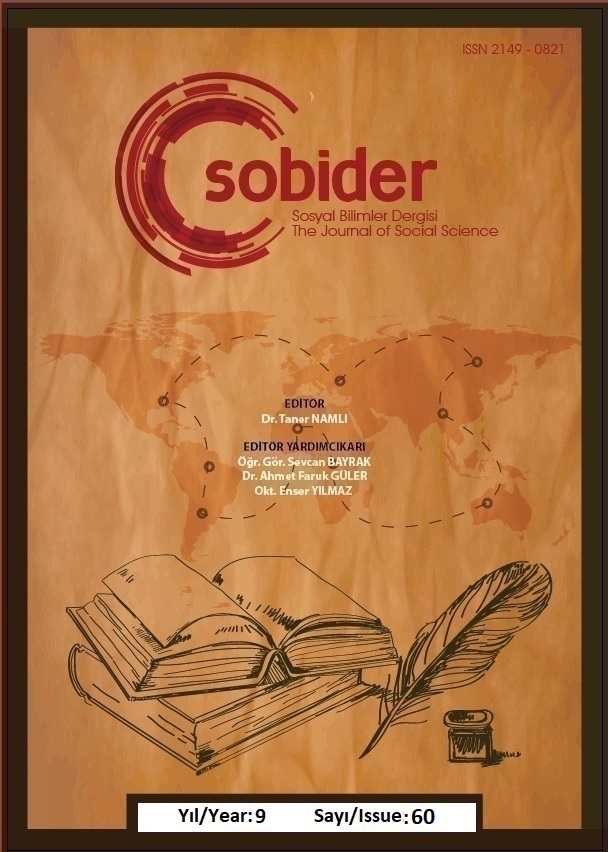Author :
Abstract
Türküler, gerek sözel unsurları gerekse ses aralıkları ve melodik yapıları bakımından halk kültürü ile müzik bilimi arasında bağ oluşturmaktadır. Bu bağı kuvvetli kılan ana taşıyıcı hiç şüphesiz, yöre insanının kültürel alt yapısı ve özgün ifade gücüdür. Türk toplumunun sanatsal anlamda milli kimlik kodlarını oluşturan türküler, âşıkların diliyle, ozanların sesiyle asırlar öncesinden günümüze ulaşmaktadır. Türkülerin konuları ve içerikleri sayesinde geçmişin izlerini hissetmekle beraber yörenin fiziki ve beşeri özelliklerini de anlayabilmekteyiz. Bu bağlamda türküler toplumun yaşayan hafızası olmakla beraber yörenin sosyo-kültürel bir zenginliğidir.
Kültür ve kimlik nişanesi olan türkülerin sözel unsurlarının ve motiflerinin incelenmesi bu araştırmanın temelini oluşturmaktadır. Çalışmada türkülerin melodik yapılarına, ritmik hareketliliklerine, makam dizilerine değinilmeden sadece sözsel analizlerine yer verilmiştir. Türküleri betimsel olarak inceleyen bu araştırma, TRT Türk Halk Müziği repertuarında yer alan ve halk arasında kulaktan kulağa, kuşaktan kuşağa okunan 45 türkü üzerinde yapılmıştır. Çorum halk kültürüne dair yazılmış tezler, çeşitli dergilerde kaleme alınmış makaleler titizlikle incelenerek çalışmanın çerçevesi oluşturulmuştur. Çalışmanın problem kısmı “Çorum türkülerindeki sözel unsurlar nasıldır ve kültürel motifler nasıl ifade edilmiştir ?” sorularıyla şekillendirilmiştir. Türkülerin konularına göre tasnif edilmelerinin ardından türkülerde geçen çeşitli öğeler, özel isimler, yaşama dair kelimeler, coğrafi unsurlar, kadın ve erkek isimleri, semboller ve motifler tablolar halinde sunulmuştur.
Araştırmanın sonuç kısmada ise hazırlanan tüm tablolara dair bahisler açılmış ve kısaca yorumlanmıştır. Çorum türküleri konuları bakımından incelendiğinde ağırlıklı olarak aşk ve sevda konulu türküler ilk sırayı almaktadır.
Keywords
Abstract
Folk songs form a link between folk culture and music science in terms of both their verbal elements, their vocal ranges and their melodic structures. The main carrier that makes this bond strong is undoubtedly the cultural background and unique expression power of the local people. The folk songs that constitute the national identity codes of the Turkish society in the artistic sense have survived centuries ago with the language of the minstrels and the voices of the bards. Thanks to the subjects and contents of the folk songs, we can understand the physical and human characteristics of the region as well as feeling the traces of the past. In this context, folk songs are the living memory of the society, as well as a socio-cultural richness of the region.
The examination of the verbal elements and motifs of the folk songs, which are cultural and identity signs, forms the basis of this research. In the study, only the verbal analyzes of the folk songs are included without mentioning their melodic structures, rhythmic movements and maqam scales. This research, which examines folk songs descriptively, was carried out on 45 folk songs included in the TRT Turkish Folk Music repertoire and sung from generation to generation among the public. The framework of the study was formed by carefully examining the theses written on the folk culture of “Çorum” and the articles written in various journals. The problem part of the study is "How are the verbal elements in “Çorum” folk songs and how are the cultural motifs expressed?" shaped by questions. After the folk songs are classified according to their subjects, various elements, proper names, words about life, geographical elements, male and female names, symbols and motifs are presented in tables.
In the conclusion part of the research, bets on all the tables prepared were opened and briefly interpreted. When the folk songs of “Çorum” are examined in terms of their subjects, the folk songs about love take the first place.
Keywords
- Akpınar, E. (2012). Eğin Türkülerinin Coğrafî Analizi, Turkish Studies - International Periodical For The Languages, Literature And History of Turkish or Turkic Volume 7/4, Fall 2012, P. 253-274,
- Ataman, A. (2009). Bu Toprağın Sesi – Halk Musikimiz, Yayına Hazırlayan: Süleyman Şenel, İstanbul: Türk Edebiyatı Vakfı Yayınları.
- Büyükyıldız, Z.,(2009). Türk Halk Müziği. İstanbul: Papatya Yayıncılık.
- Duman, O. (2016). Çorum Türküleri Üzerine Bir İnceleme, Ahi Evran Üniversitesi Sosyal Bilimler Enstitüsü Türk Dili ve Edebiyatı Anabilim Dalı, Basılmamış Yüksek Lisans Tezi. Kırşehir.
- Karakoç, B.T. (2021). Türkü Formunda Bestelenen Şiirler Üzerine Bir İnceleme “Şair Dursun Ali Akınet Şiirleri” Örneği, Müzik Kültürüne Dair Çeşitli Görüşler V, Eğitim Yayınevi Konya.
- Tümertekin, E.,Özgüç, N.( 1997). Beşeri Coğrafya İnsan-Kültür- Mekan, İstanbul: Cantay kitabevi.
- Yücel, H., (2016). Merzifon’un Kültürel Mirası: Merzifon Türküleri, Uluslararası Sosyal Araştırmalar Dergisi, Cilt: 9 Sayı: 42, www.Sosyalarastirmalar.com ISSN: 1307-9581.
- Yücel, H., (2018). Amasya Türkülerinin Söz ve Müzik Unsurları Bakımından İncelenmesi, Sosyal Bilimler Dergisi, Yıl: 5, Sayı: 22, Nisan 2018, S. 372-386.
- Yücel, H. (2012). Âşık Musikisi ve Beste Formları Üzerine Bir İnceleme, Âşık Musikisi ve Beste Formları Üzerine Bir İnceleme” Akademik Bakış Uluslararası Hakemli Sosyal Bilimler E-Dergisi Sayı: 32 Eylül – Ekim ss:1-16.
- Yücel, H., Karakoç; B. T. (2020). Konuları, İçerikleri, Sözel Motifleri ve Sembolleri İle Ordu Türküleri, TURAN-SAM Uluslararası Bilimsel Hakemli Dergisi; ISSN: 1308-8041, eISSN: 1309-4033; Yıl: 2020; Cilt: 12, Sayı: 46.
- Yücel, H. (2021). Merzifonlu Âşık Musa Aslan Türkülerinin Müzikal Analizi, Sosyal Bilimler Dergisi / The Journal Of Social Science, Yıl: 8, Sayı: 53, Nisan 2021, S. 31-56. ISSN: 2149-0821 Doi Number:http://dx.doi.org/10.29228/SOBIDER.52332
- URL Erişim lFJnw0QlP4Si1g:1632244387357&source=lnms&tbm=isch&sa=X&ved=2ahUKEwjD3 5OXyJDzAhUQ_7sIHT_YBLQQ_AUoAnoECAEQBA&biw=1517&bih=694&dpr=0. 9#imgrc=C64HCf_WzAk-eM, 20.09.2021
- https://corum.ktb.gov.tr/TR-58671/cografya.html, 20.09.2021





